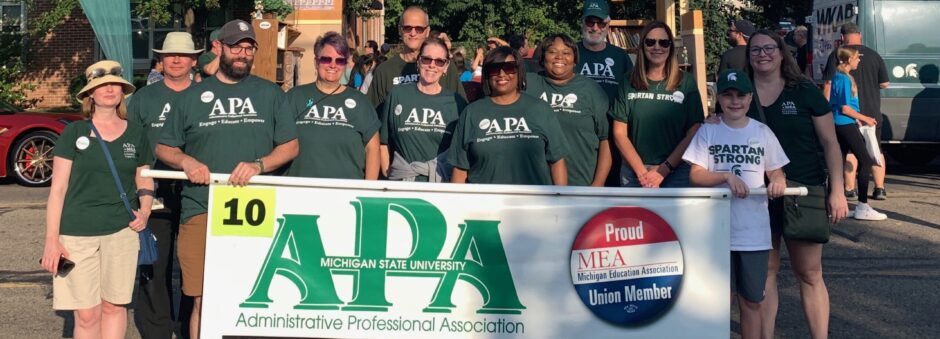Everyone wants the best working environment possible. For each employee that perfect environment may be different based on personality and skill set. When you encounter a conflict at work you may need to make an assessment whether the problem is a contractual violation or merely a nuisance.
The first step in deciding if it is a contractual violation is to assess if the situation is a working condition covered by the MSU-APA Contract or state/federal laws such as use of paid leave (sick, personal, vacation), Family Medical Leave Act (FMLA), overtime, working hours or wages.
There are typically four major types of grievances:
- Plain Violation of the Contract which is a direct violation of the clear contract language.
- Disagreement over Interpretation of the Contract
- Fact Disputes – does management believe a different set of facts than the employee
- Equity Disputes – has the contract or the work issue been applied equally to all employees
If the answer is “yes it is a working conditionâ€, then refer to your contract at www.msuapa.org and contact the MSU APA office if the issue cannot be resolved.
If the answer is “no the situation is not a working conditionâ€, then you need to assess if it is a situation than can be solved with in your area or department. If it cannot be solved directly by you, call the MSU APA office for advice for how to deal with your specific situation.
Is it a grievance? Here are some common situations that depending on the facts, may or may not be a grievance:
1 ) My supervisor doesn’t like me and does not communicate with me.
This is not a grievance, but it is a problem that needs to be resolved before the lack of communication creates a disconnect between management expectations and the employee’s work performance. You can call the APA office for advice on how to handle the situation.
2 ) My colleague doesn’t do his/her job and their duties are then assigned to me by my supervisor.
This may or may not be grievance depending on the facts.
You are not responsible to be a manager of a fellow employee and therefore, if they are not doing their job, although it may affect you, it is not your responsibility to do something about it.
It could be a grievance if you are doing the duties of another job that is a higher classification (Article 15 Classification/Reclassification), if you should be compensated for the extra work, or if you are a Level 8, 9, 10 or 11 and are being asked to work more than 40 hours (Article 18 Special Provisions). www.msuapa.org
3 ) I was hired in with a job title that has since been significantly changed to no longer include the original duties.
It could be a grievance that would need to be addressed with a reclassification and    commensurate compensation. It could also be a violation depending on which position you have been evaluated.
4 ) My vacation request was denied.
This may or may not be grievance. What are the circumstances around the request? How much notice was given? Did the supervisor respond in a timely manner? Is this the first time vacation has been denied (Article 21 Vacation Pay). Is the denial of vacation being used as discipline (Article 10 Settlement of Disputes)?
5 ) I’ve always worked remotely and got a new supervisor that is requiring me to come to campus to work.
It is a management right to set the time and location of your work. Some extenuating factors may be the reasonableness of the request, was appropriate notice given if it is a change in current practice and is the change being used as discipline (Article 10 Settlement of Disputes).
6 ) I am a Level 11 and was ordered to work beyond 40 hours and was told I would be given compensatory time off at straight time.
This is a grievance. A Level 8, 9, 10 or 11 has a right to overtime if they are required to work in excess of 40 hours in a work week. It is up to the employee if they want to use the time at time and half as compensatory time. It is not a decision up to the Employer (Article 18 Special Provisions).
7 ) I was asked to provide a physician’s note for every sick leave day even though I have FMLA paperwork on file for that type of illness.
This may or may not be grievance based on the facts. The contract provides that the Employer may ask for a physician’s note for sick leave Article 24 Sick Leave, Clause 188. However, there needs to be cause substantiated prior to the Employer request.
For regular use of sick leave for a qualifying medical condition under the Family Medical Leave Act (FMLA), the Employer may require medical certification. Once the medical certification is provided an employee should not have to provide additional physician’s statement for each FMLA qualifying illness sick leave day.
8 ) My supervisor is harassing me.
The definition of harassment in employment is very specific and directly related to protected classes (race, gender, religion, national origin, age and disability).
If the harassment is based on gender (sex) than it may be a violation of state and federal laws and the MSU Sexual Harassment Policy (http://www.hr.msu.edu/documents/uwidepolproc/sexharass.htm).
An employee does not have to be subjected to a hostile work environment. Keep in mind, a supervisor with poor management skills may not rise to the level of harassment. Contact the APA office with any workplace concerns of this nature (517) 353-4898.
